Funding public projects: A Case for the Nash product rule
Florian Brandl (University of Bonn), Felix Brandt (Technische Universität München), Matthias Greger (Technische Universität München), Dominik Peters (University of Toronto), Christian Stricker (Technische Universität München) and Warut Suksompong (National University of Singapore)
GPI Working Paper No. 14-2021, published in Journal of Mathematical Economics
We study a mechanism design problem where a community of agents wishes to fund public projects via voluntary monetary contributions by the community members. This serves as a model for public expenditure without an exogenously available budget, such as participatory budgeting or voluntary tax programs, as well as donor coordination when interpreting charities as public projects and donations as contributions. Our aim is to identify a mutually beneficial distribution of the individual contributions. In the preference aggregation problem that we study, agents report linear utility functions over projects together with the amount of their contributions, and the mechanism determines a socially optimal distribution of the money. We identify a specific mechanism—the Nash product rule—which picks the distribution that maximizes the product of the agents’ utilities. This rule is Pareto efficient, and we prove that it satisfies attractive incentive properties: it spends each agent’s contribution only on projects the agent finds acceptable, and agents are strongly incentivized to participate.
Other working papers
The scope of longtermism – David Thorstad (Global Priorities Institute, University of Oxford)
Longtermism holds roughly that in many decision situations, the best thing we can do is what is best for the long-term future. The scope question for longtermism asks: how large is the class of decision situations for which longtermism holds? Although longtermism was initially developed to describe the situation of…
Time Bias and Altruism – Leora Urim Sung (University College London)
We are typically near-future biased, being more concerned with our near future than our distant future. This near-future bias can be directed at others too, being more concerned with their near future than their distant future. In this paper, I argue that, because we discount the future in this way, beyond a certain point in time, we morally ought to be more concerned with the present well- being of others than with the well-being of our distant future selves. It follows that we morally ought to sacrifice…
Cassandra’s Curse: A second tragedy of the commons – Philippe Colo (ETH Zurich)
This paper studies why scientific forecasts regarding exceptional or rare events generally fail to trigger adequate public response. I consider a game of contribution to a public bad. Prior to the game, I assume contributors receive non-verifiable expert advice regarding uncertain damages. In addition, I assume that the expert cares only about social welfare. Under mild assumptions, I show that no information transmission can happen at equilibrium when the number of contributors…

